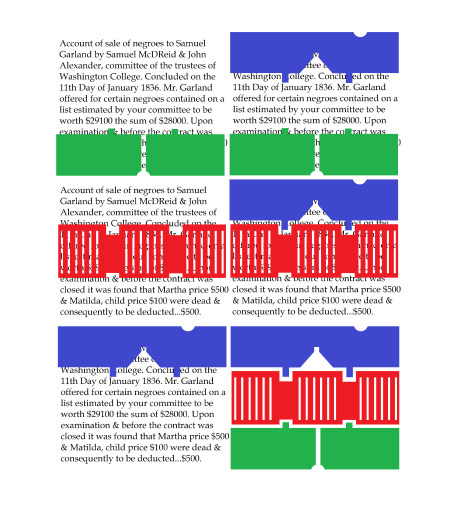Generally Doubtful

I’ve not written about the Generals Redoubt since 2019. The alumni group first came to my attention when they suggested in a mass email that I be “eliminated” for teaching “inane” and “trivial” courses. I responded: “Why I Shouldn’t Be Fired for Teaching Comics.” I then had a lengthy email correspondence with a leading member of the organization, which I excerpted at length: “My Ongoing Attempts to Reason with the Generals Redoubt.” Afterward, I offered my conclusions about the inability to interact meaningfully with that member: “Redoubtfully.”
Mass emails from the Generals Redoubt have continued to appear regularly in my inbox since. I usually give each a quick skim, and I’m usually disappointed by the quality of their content. I then tap delete and move on to more rewarding tasks. But for whatever reason, I am going to again give the organization the benefit of the doubt and see where a careful reading takes me.
In a June email, Kamron Spivey expressed his hope that his alma mater would not “endorse the fleeting fixation on identity-based education,” which he described as “quite dangerous to the educational mission of Washington and Lee.” He also said that “none have articulated this concern better than” alumnus Garland Tucker, whose essay was attached.
Mr. Tucker, who graduated in 1969, offered five laments:
The “sad secularization” of baccalaureate included “no prayer, and no mention of the Almighty,” but merely “an eloquent address” that provided “no evidence of the Judeo-Christian principles that undergirded the W&L” of the 1960s.The commencement speech referenced “the University (instead of Lee) Chapel.”The commencement speech mentioned only George Washington’s financial contribution.The commencement speech omitted “entirely any mention of Robert E. Lee,” which “reinforced the impression that one of President Dudley’s overriding objectives is to ignore — and thereby remove — the defining influence of Lee on this institution.”The word “inclusive” appeared before “business leaders” in “the C-School’s current mission statement” on display in “the entrance to Huntley Hall.”Together these observations left Mr. Tucker feeling “concerned about the continuing trajectory of wokeness” at W&L.
I assume that Mr. Spivey was speaking hyperbolically when he claimed that Mr. Tucker’s essay was the best (or at least equal to the best) articulation of concerns regarding the dangers of identity-based education.
Mr. Tucker’s first point expresses the opposite: that baccalaureate should express a specifically Christian identity, which would increase rather than decrease “identity-based education.”
Mr. Tucker’s last point is similar: “inclusiveness” in an educational mission means that all identities are valued. An “identity-based education” would instead privilege some identities over others. When Mr. Tucker was a student, for example, W&L excluded Black men and all women.
Mr. Tucker’s middle concerns are focused on the school’s namesakes, including that Lee and Washington should be discussed as role models in every graduation speech and that Lee’s name should be on the Chapel. Since Mr. Tucker referenced “Lee House” and “W&L”( the abbreviation for “Washington and Lee”) fifteen times in his essay, he provides ample evidence that Lee is not being ignored or removed.
But even if Mr. Tucker’s claims were accurate, what exactly are the dangers to W&L’s educational mission? The word “inclusiveness,” the absence of “Lee” in a building name, the avoidance of Christian prayer in a university event – do he and Mr. Spivey actually believe these are “dangerous”?
Mr. Tucker’s essay recalls far worse possibilities. Returning to Mr. Tucker’s “C-School days” of 1969 would mean championing Christianity above all other beliefs and excluding individuals based on their race and gender, policies that would be rhetorically emphasized by highlighting the name of a Confederate general more widely in plaques and speeches.
If W&L did that, the dangers of “identity-based education” would increase. The school would be tailored to the identities of white, male, Confederate-nostalgic Christians. That’s the past Mr. Tucker praises, and that is the past that Mr. Spivey and the Generals Redoubt endorse.
I don’t wish to be overly critical of Mr. Spivey though. All of my personal interactions with him when he was a student were pleasant, and his reporting of a book-banning incident at our local middle school was admirably accurate. Setting aside his presumably insincere praise of Mr. Tucker, he could become a force of reasonableness within his alumni organization. An earlier email provides an example.
In March, Stephen Robinson, president of the Generals Redoubt, wrote about John Robinson: “A trustee of Washington College, his estate, valued at $50,000, saved the struggling institution, which at the time had only 65 students and inadequate facilities.” Stephen (who clarifies in his signature that he is unrelated to the 19th-century Robinson) added: “In the frantic rush to achieve political correctness in 2019, Washington and Lee University decided — apparently because Mr. Robinson (as many did at the time) owned slaves — that it was not appropriate to have a building named for him.” Citing the dedication speech for a historical marker acknowledging the school’s first Black student, Stephen asked: “Can anyone seriously contend that the current Administration is ‘tell(ing) the history of Washington and Lee courageously and completely?’”
Stephen undermines his critique with the incompleteness of his own account. John Robinson’s institution-saving donation included 76 enslaved people, whom the school then sold. Was it courageous of the president of the Generals Redoubt to omit that detail about the Robinson “estate, valued at $50,000”?
Fortunately, the organization now has Mr. Spivey for historical fact-checking. A simultaneous March article in The Spectator cited Mr. Spivey at length:
“Spivey said that while the signage recognizes many slaves owned by the university, a portion of the information on the memorial is incorrect. For example, the sign says that ‘the most well-documented episode [of the university’s involvement with slavery] … is the 1826 bequest of 84 enslaved African Americans to Washington College from “Jockey” John Robinson.’ But at the time of Robinson’s death, the number of enslaved people bequeathed was 76.
“According to Spivey, this inaccuracy owes to the nature of the document used in the 2016 memorial. While the document lists the names of 84 enslaved people, Spivey said it was a ‘living document’ that was updated for several years as children were born into slavery.
“‘The Enslaved People bequeathed to Washington College in 1826 are not easily biographized,’ Spivey’s pamphlet reads. ‘We know very little beyond their age, first name, and ‘appraised value’ of between $0 to $500 each.’”
I find the contrast between Mr. Spivey’s thoroughly accurate account and the hypocritically incomplete telling by the president of the Generals Redoubt striking.
While I hope that Mr. Spivey has a positive influence on the organization, he will need to avoid the false hyperboles and hollow rhetoric of fundraising ad copy and instead maintain the journalistic integrity he learned as a recent W&L student. Maintaining and promoting the excellence of that education is after all the expressed purpose of his alumni group.

Chris Gavaler's Blog
- Chris Gavaler's profile
- 3 followers



